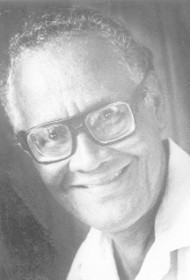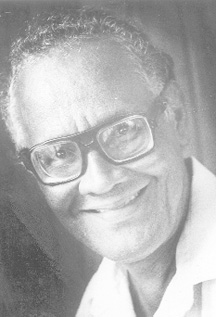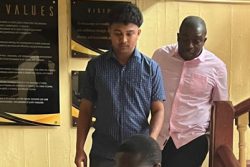On the anniversary of Martin Carter’s death Gemma Robinson reassesses his poetry from the 1950s and its origins during the early years of his marriage to Phyllis Carter.
When Phyllis Carter died earlier this year, her passing was mourned by family and friends around the world. Among the many sorrows provoked, it signalled the final conclusion of a long marriage that had been cut short by her husband’s death in 1997. For the following thirteen years Phyllis had been the generous custodian of Martin Carter’s work, sharing his acts of kindness, principles of co-operation and formidable intelligence. What makes a literary marriage and what are its rewards?
To some it describes the entwined lives of two artists, an intense domestic and working relationship that helps define the literature of a period (think of Suzanne and Aimé Césaire in twentieth-century Martinique or Simone de Beauvoir and Jean Paul Sartre in post-war France). For others it is a partnership of writer and (most often) supporting wife, with the attending successes and pressures that caring brings (think of Kamau and Doris Brathwaite or VS and Patricia Naipaul). Whatever form a literary marriage takes, the artistic work that is produced can act as an index on that relationship. While we should be suspicious of reading literature as autobiography, for some writers the transformation of lived lives into poetry means that the marks of their relationships are inked into their work.
 The poetry of Martin Carter voices the risks and the wonder of living in the twentieth century, and his particular fusion of protest and lyric led Carter to reflect on his marriage and family. For Guyana’s ‘protest poet’ was also a lyric poet, that is a poet whose work dramatises subjective felt experience. Most insistently in Poems of Resistance (1954) we find Carter attempting to make sense of his anti-colonial beliefs and political comradeship through a commitment to his young family, as well as a larger community. The resulting poetry is both documentary – exposing the realities of protest – and emotionally searching – distilling the feelings of a young man, husband and father into what Carter called ‘poet words, nuggets out of corruption / or jewels dug from dung or speech from flesh’ (‘Words’ (1957)). If this imagery is brutal, it nonetheless registers the costs of artistic creation, of the exacting attempt to translate life into poetry. In the early 1950s there were other prices to pay, and the cost of Carter’s political interests was imprisonment, as he joined the PPP and much of Guyana’s population to protest against colonial life, the occupation by British forces and the State of Emergency that swept his party out of office in October 1953.
The poetry of Martin Carter voices the risks and the wonder of living in the twentieth century, and his particular fusion of protest and lyric led Carter to reflect on his marriage and family. For Guyana’s ‘protest poet’ was also a lyric poet, that is a poet whose work dramatises subjective felt experience. Most insistently in Poems of Resistance (1954) we find Carter attempting to make sense of his anti-colonial beliefs and political comradeship through a commitment to his young family, as well as a larger community. The resulting poetry is both documentary – exposing the realities of protest – and emotionally searching – distilling the feelings of a young man, husband and father into what Carter called ‘poet words, nuggets out of corruption / or jewels dug from dung or speech from flesh’ (‘Words’ (1957)). If this imagery is brutal, it nonetheless registers the costs of artistic creation, of the exacting attempt to translate life into poetry. In the early 1950s there were other prices to pay, and the cost of Carter’s political interests was imprisonment, as he joined the PPP and much of Guyana’s population to protest against colonial life, the occupation by British forces and the State of Emergency that swept his party out of office in October 1953.
When we read Poems of Resistance Carter’s ‘Letter’ poems speak of a revolution waiting to happen, and in the first he imagines success: ‘If I do not live to see that day / My son will see it. / If he does not see that day / His son will see it. / And it will come circling the world like fire’ (‘Letter 1’). If this is confidence, it is not naïve. In ‘Letter 2’ the internationalist passion is tempered by very intimate and immediate concerns:
O my darling!
O my dear wife whose voice I cannot hear
Tell me, the young one, is he creeping now
And is he well and mischievous as ever?
Or is the cloud so heavy on the land
Too deep for him to see the wonderful sky?
I send a kiss to tell you everything
about to-day the twentieth in the distance.
Here nature (‘the cloud’ and ‘wonderful sky’) and the domestic (mother and crawling son) are both under threat, but these lines also act as a code, referring to an earlier poem that keeps the faith of ‘revolt’. ‘Shines the Beauty of my Darling’ (published in The Hill of Fire Glows Red (1951)) was the first time Carter wrote of love:
like the whole world dancing
for liberation from the slave maker
shines the beauty of my darling in her laughing eyes.
Linking ‘my darling’ to a carnivalesque revolution, this poem asserts love poetry’s political tenor. He writes ‘no matter where I turn / the fierce revolt goes with me / like a kiss’, embracing contemporary anti-colonial struggles in Malaya, Vietnam, India and Africa. When Carter repeats the words ‘darling’ and ‘kiss’ in ‘Letter 2’ they are charged with the promises and passions of the earlier poem; they are short-hand (‘I send a kiss to tell you everything’) for the politicised love poetry that Carter had formulated before the Emergency and now reactivated while imprisoned.
Indeed Carter’s now famous song of ‘the dark time’ is expressed to a romantic partner: ‘This is the dark time my love. / It is the season of oppression, dark metal, and tears. / It is the festival of guns, the carnival of misery’ (‘This is the Dark Time my Love’). As in ‘Shines the Beauty of my Darling’ Carter recognises the formalities of writing love poetry (romance and night-time are common pairings) and then harnesses them to anti-colonial resistance. Yet it was not just poetic acts that were transformed in this time of crisis in Guyana, the very question of how to act in the world raised new problems for all. During the period from 1951 to 1953 Phyllis and Martin had been sweethearts, married and become parents, and while Carter was detained Phyllis’s answer to the question of how to act was quick-witted, brave and empowering.
Martin Carter and Phyllis Howard married in 1953. Both the children of civil servants, Phyllis was a trained nurse and Martin a clerk in the Prison Service. They had known each other since they were children, when Carter would cycle with Phyllis’s brothers to her home. Phyllis remembers Carter’s bicycle as a constant presence during their courtship, as he would join her to cycle to and from nursing school. These shared journeys would take on a different resonance when Carter and four other PPP members were arrested on Plantation Blairmont in October 1953 for “spreading dissension.” Although it took two days to discover the new location of Carter, Phyllis regularly visited her husband, taking the unmetalled road from Georgetown.
Each prisoner was allowed only one visitor at Atkinson Field by written permission. Phyllis had been caring for David Rose (a prominent government official) who was recovering from typhoid at Georgetown Hospital. She asked if he could help, and he arranged the permission. Phyllis was never searched when she visited Atkinson Field, and this became key to her role in the publication of Poems of Resistance.
Much has been written about the poems that Carter wrote while imprisoned. The story however does not begin with the 1954 edition of Poems of Resistance from British Guiana; it begins with six anonymously written poems seized by the police from the Magnet Printery in Georgetown shortly after Carter was arrested in 1953. Promptly sent to London’s Colonial Office, the poems were: ‘I Will Not Still My Voice’, ‘This Is The Dark Time My Love’, ‘Shines the Beauty of My Darling’, ‘Tomorrow and the World’, ‘Let Freedom Wake Him’ and ‘I Clench My Fist.’ British civil servants worried that the poems had been written by senior civil servant, A J Seymour, but quickly realised that the author was Carter, a known radical.
Phyllis Carter and Janet Jagan were the force behind this publication, gathering the work and driving through Georgetown during the Emergency to the printers. And they acted quickly: British troops arrived on the 8th October, Carter was arrested on the 25th and the poems were seized on the 29th. The previously unpublished ‘This Is The Dark Time My Love’, ‘Let Freedom Wake Him’ and ‘I Clench My Fist’ directly address occupation and could have been written while Carter was in detention, and if they were, they must have been composed at a furious speed over a few days at the very most. Only this would have given Phyllis enough time to smuggle them out of Atkinson Field and deliver them to the printers. Unfortunately, there is no archive to which we can turn to confirm these events. Certainly, Phyllis smuggled out letters and poems by her husband – even hiding papers beneath her son’s cot during one search of their Anira Street home. But which poems were strictly the ‘prison poems’? No-one is certain. Phyllis believed she could have smuggled out the Letter poems, ‘This is the Dark Time my Love’ and ‘I Clench my Fist.’
Even if we cannot resolve definitively these prison poems, we can confirm that they were not just the result of detention at Atkinson Field. In 1954 Carter was imprisoned again – this time in his former workplace, the Camp Street Prison – charged for taking part in an illegal procession. Phyllis remembers the fifteen minute visits with inmates and visitors standing across a counter.
Wearing a khaki and grey prison uniform, Carter would remove his cap, placing it on the counter. Hidden underneath would be a letter or a poem. The poem, ‘Where Are Those Human Hands,’ was the only poem that Phyllis remembered as having been smuggled out in this way, although she thought there were probably more. First published in Thunder (the PPP’s journal) in 1954, the poem asks: “O wall of prison, iron, stone and sorrow / where are those human hands that built you up?” As a poet, what Carter did with pen in hand was crucial, but the symbolism of ‘human hands’ is more searching: it speaks of both the hope and despair of human action.
A life with Martin Carter, Phyllis recognised, would be extraordinary, but that did not stop her from living this life with understated grace. When Carter resigned as Minister of Information and Culture in November 1970 it was front page news. The Guyana Graphic reported that he wanted to live “simply as a poet, remaining with the people . . . I will not starve. I have friends . . . I have nothing more to say now. I believe in human decency. I believe in people.” Phyllis’s comments were also quoted in the Sunday Graphic:
“When Martin is happy, I am happy. If he is happy by his decision to quit the Cabinet, I am happy for that decision. After all what is important is that a man is happy in what he is doing. Martin was obviously unhappy . . . I have lived through many years of crises with my husband who is a poet. Even while he was in government, things for me were quite the same. Now it is simply a continuation of the life I have been living with him as a poet . . . Those who know of his virtue, of his contributions to the society as a poet need no enlightenment.”
The “many years of crises” are worn lightly here by Phyllis, and her repetition of Carter’s status as ‘a poet’ is pronounced. Their literary marriage may appear to be one of writer and supporting wife, but this paradigm always underplays and undervalues the lives of the women involved. Phyllis asserts Carter’s ‘virtue’ but his life was clearly bound up with her virtues as well.
Although known for solitary writing in his Lamaha Street study, Carter also saw the collective endeavour of his poetry, and writing was part of family life. For example, Phyllis remembers her husband writing poems and stuffing them in the glove compartment as she drove them and their four children to their holidays on the coast. In the manuscripts of his 1980 collection, Poems of Affinity, a note is written alongside ‘Calendar’(a poem which was later revised as ‘Some kind of fury’):
written in Rayman’s house where the spirit came.
For Agnes and the children from Martin, Phyllis and my own children with love.
I have learnt how to refuse to be afraid.
Carter writes of inspiration (“the spirit”), collaboration and the overcoming of fear. In ‘Some kind of fury’ he writes “I / keep working for a storm.” Is this revolution by another name? Perhaps, but Carter’s revolution was never simply political. It was a revolution called for by a poet who wanted to overthrow colonialism and find a way for humans to live freely. Part of that hope was expressed through poetry, and it was also expressed through love of family.
After a life-time together Phyllis and Martin had witnessed and been actors in the major events of twentieth-century Guyana. However, neither played these roles as grand heroes; they were both insistently human and insisted on human fellowship: they were woman and man, wife and husband, mother and father, publisher and poet, and fellow activists. During the 1950s crisis, Kyk-Over-Al published Carter’s lullaby, ‘For my Son’ (1954):
The street is in darkness
Children are sleeping
Mankind is dreaming
It is midnight
It is midnight
The sun is away
Stars peep at cradles
Far seems the day
Who will awaken
One little flower
Sleeping and growing
Hour and hour
Dew is awake
Morning is soon
Mankind is risen
Flowers will bloom
Today when we miss both Phyllis and Martin Carter, we must acknowledge our sadness, but in reading this simple song we also pay tribute to their shared life and hope for a world beyond ‘the dark time.’
Gemma Robinson is the editor of University of Hunger: Collected Poems and Selected Prose of Martin Carter (Tarsett: Bloodaxe, 2006). Many of the biographical and bibliographical details discussed in this article are the result of invaluable conversations with Phyllis Carter in the period 1995-2010.









